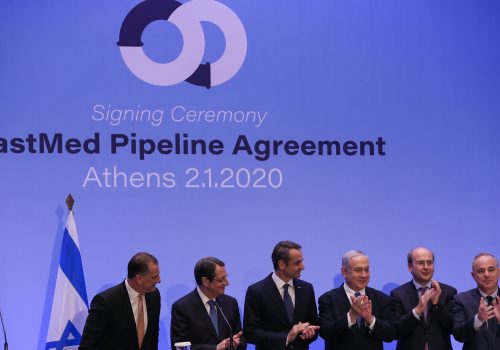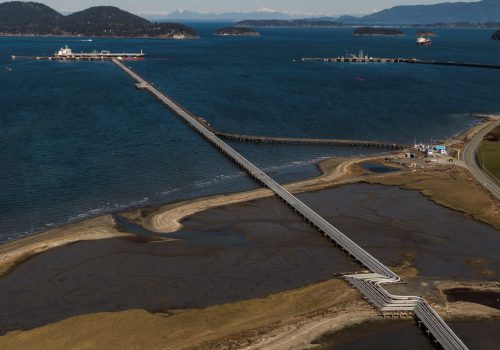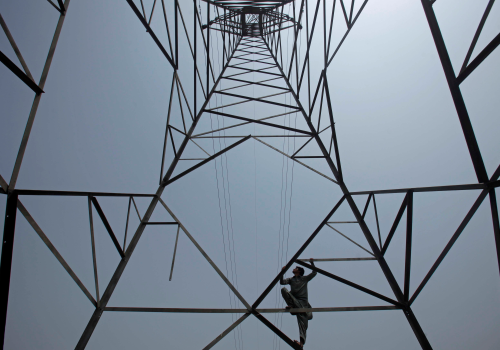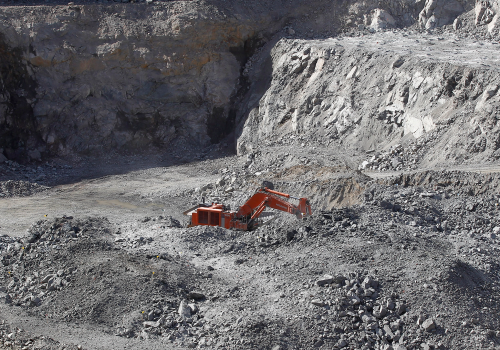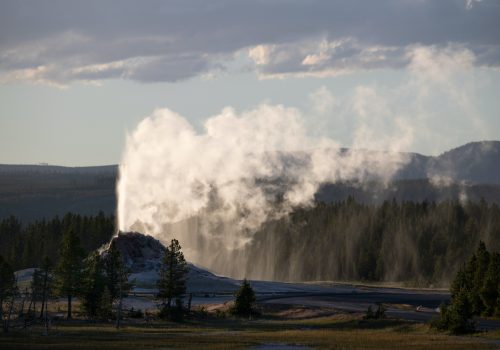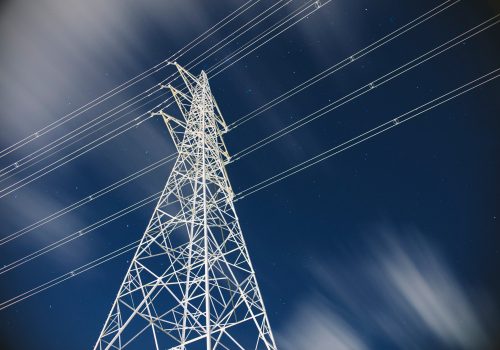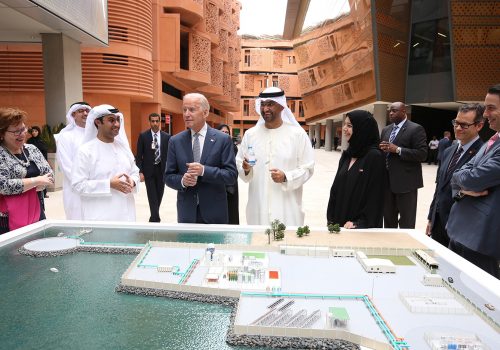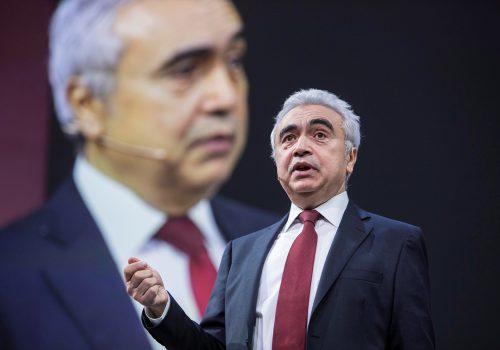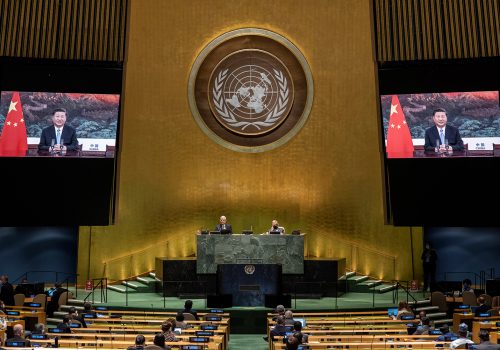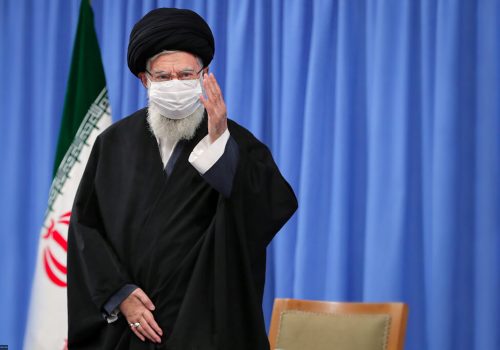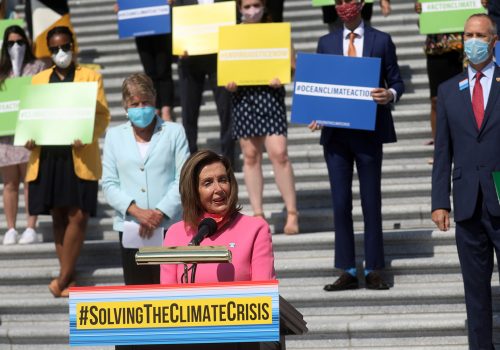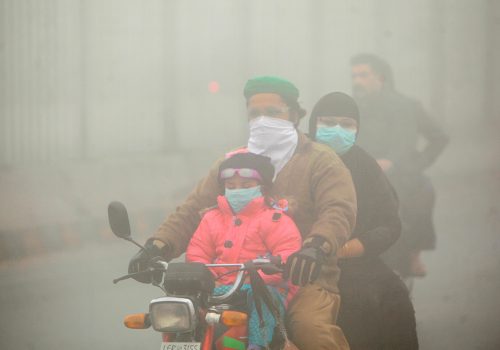Meet the global leaders powering the world’s energy transition
The return of pre-pandemic energy consumption. Threats of cyberattacks on critical infrastructure. And a generation-defining war in Europe with global repercussions.
All have dampened hopes for a swift energy transition—but none have discouraged the world’s movers and shakers in the energy industry from finding solutions. The Atlantic Council’s sixth annual Global Energy Forum, which took place March 28 and 29 in Dubai, is where they discussed the tools, policies, and models essential to responding to these and other major trends in the sector.
Here, you’ll find the highlights from the event, which was hosted by the Atlantic Council’s Global Energy Center in partnership with the United Arab Emirates’ Ministry of Energy and Infrastructure and in conjunction with the 2022 World Government Summit.
Here’s the latest news from GEF:
- Getting off Russian gas: Practical steps for Europe
- South, Southeast Asia consider decarbonization
- After the war in Ukraine: New energy for a new Europe?
- Where does environmental, social, and corporate governance go from here?
- Resilience and reliability in the face of evolving threats
- Big problems for small island nations
- How nuclear energy can power a Just Transition
- Is there a future for natural gas in the Eastern Mediterranean?
- Think ‘transformation,’ not transition
- How helpful could hydrogen be?
- This is how the United Arab Emirates does it
- Don’t count out Iraqi Kurdistan
- Meet the Green Builders of Tomorrow
- Why natural gas is staying—not going
- Will energy security derail the transition? (Part two)
- In Europe, ‘the writing has been on the wall’
- Leading oil and gas into a net-zero world
- Will energy security derail the transition? (Part one)
- Urgency and reality collide as GEF kicks off
- Pakistan: The next great infrastructure connector
- The United States, Canada, and the minerals challenge
- Unearthing potential: The value of geothermal energy to US decarbonization
- The 2022 Global Energy Agenda
- In the wake of the pandemic, new thinking on the way to net zero
- Catch up on last year’s Global Energy Forum
MARCH 29, 2022 | 11:37 AM WASHINGTON, 7:37 PM DUBAI
Getting off Russian gas: Practical steps for Europe
The war in Ukraine has sparked serious discussion about how Europe can quit Russian fossil fuels. But what can it do right now to reduce its dependence on Russian natural gas?
In a Tuesday GEF panel, Richard Morningstar, founding chairman of the Atlantic Council’s Global Energy Center, emphatically argued that the United States must clearly assert the role of natural gas in a decarbonized world. This message must be relayed to Europe, to the finance community, and to the oil and gas industry and exporter companies, he said. But in the near term, Morningstar suggested a strategy that focuses on critical interconnectors around the Balkans and existing pipelines.
Charles Hendry, a professor at the University of Edinburgh, offered a similar view—recommending that Europe carefully review new potential sources of supply, such as Turkmenistan, Kurdistan and others. He also argued for using existing infrastructure to its fullest capacity, and that the EU Commission should consider rapidly approving projects already in consideration to improve the energy security situation quicker.
In the longer term, Michał Kurtyka, the president of COP24, argued that Poland’s efforts to diversify its energy options have shown the way forward, adding that the EU Commission must show leadership in moving away from Russian natural gas even if the near-term economic pain proves significant.
Ana Birchall, special envoy for strategic and international affairs for Nuclearelectricak, argued from the Romanian perspective: that acknowledging the role of natural gas and nuclear energy in the new European Taxonomy for Sustainable Finance is a key step to supporting European energy security.
All agreed that the challenge ahead remains enormous—with a difficult winter likely ahead for Europe, even in an ideal scenario.
—Andrea Clabough is a nonresident fellow at the Global Energy Center.
MARCH 29, 2022 | 10:51 AM WASHINGTON, 6:51 PM DUBAI
South, Southeast Asia consider decarbonization
The rapidly developing economies of South and Southeast Asia are ripe for decarbonization—but require a nuanced understanding of the region’s unique needs, according to a GEF panel of think tank, government, and private sector experts.
Desiree Tung, deputy director of external relations at the Energy Market Authority of Singapore and Kavita Gandhi, executive director of the Sustainable Energy Association of Singapore, used the island nation as an example of what can be achieved when sound policy design meets robust, clear government signals.
Tung pointed to the Singapore Green Plan, which set out new targets for decarbonizing the economy; she and Gandhi both highlighted the pivotal role this document played in catalyzing key investments in that country’s clean energy sector. Both also noted the challenges facing Singapore and other countries in this region—particularly around availability of renewable resources and land use constraints (though thoughtful Singaporean leadership has managed these challenges, they said). Regional trading of renewable electricity, for example, is one concept that’s being actively explored.
Another key theme of the panel was the role of natural gas. Robert Fee, vice president of international affairs and commercial development at Cheniere Energy, and Derek Wong, senior director of government and public affairs at Excelerate Energy, highlighted the importance of gas to balance and support a wide expansion of renewable energy in the region while also achieving significant emissions reductions.
More broadly, the panelists all agreed with a key theme of the Global Energy Forum: Strength in energy security lies in energy diversity. They felt confident that the South and Southeast Asia region is very capable of achieving diversity of energy supply while also meeting its climate objectives.
—Andrea Clabough is a nonresident fellow at the Global Energy Center.
MARCH 29, 2022 | 9:45 AM WASHINGTON, 5:45 PM DUBAI
After the war in Ukraine: New energy for a new Europe?
Despite Russia’s brutal assault against his country, DTEK CEO Maxim Timchenko predicted a brighter energy future for Ukraine, grounded in deeper integration with western Europe. More specifically, he pointed to the existing gas transit infrastructure, the capacity of Ukraine to supply Europe with its own natural gas, as well as the considerable potential for renewable energy—especially wind—as particular assets. Ukraine, he added, could also be at the cutting edge of advanced nuclear energy deployment.
But above all, Timchenko stressed that countries and companies should end their purchases of Russian energy (and other commodities) as soon as possible to help end the violence.
Other panelists focused on steps Europe should take in the eventual aftermath of the war. Paula Dobriansky, senior fellow at the Harvard Kennedy School of Government, said the United States and European Union should build upon a new spirit of collaboration and unity in the face of Russia’s weaponization of energy.
Charles Hendry, a professor at the University of Edinburgh, added that the West should develop a “Marshall Plan” for Ukraine with an emphasis on rebuilding Ukrainian energy infrastructure.
Finally, Ana Palacio, a former Spanish foreign minister, noted that ending Europe’s dependence on Russian natural gas is far easier said than done, and the continent has a great deal of work left—particularly on energy storage—to shore up its energy security.
—Andrea Clabough is a nonresident fellow at the Global Energy Center.
MARCH 29, 2022 | 8:25 AM WASHINGTON, 4:25 PM DUBAI
Where does environmental, social, and corporate governance go from here?
From being just another buzzword around the energy transition to a fundamental component of how all companies operate—that’s where environmental, social, and corporate governance (ESG) should head next, according to a GEF panel representing corporate voices throughout the financial, investing, and consumer-goods sectors.
Neil Brown, managing director of the KKR Global Institute and KKR Infrastructure, argued that every company can do its part by integrating ESG into its business in meaningful ways—and improve their overall asset performance along the way. In his view, the future of ESG will focus on bringing the principles into high-emissions (or otherwise challenging) sectors that are still essential to the modern economy.
But the panel also highlighted transparency and verifiability as key aspects of making ESG effective in every business environment. Alain Bejjani, chief executive officer at Majid Al Futtaim Holding, noted that transparency is a strength, not a liability, for his company, while Kristen Siemen, chief sustainability officer at General Motors, added that ESG is now so integrated into her company’s culture that it’s part of every employee’s job.
There was also discussion around the importance of a global framework for ESG that would put all companies on a level playing field to reassure investors. Such a component—combined with independent verification of companies’ ESG metrics and achievements—could facilitate a much deeper understanding of ESG by all stakeholders.
—Andrea Clabough is a nonresident fellow at the Global Energy Center.
MARCH 29, 2022 | 7:31 AM WASHINGTON, 3:31 PM DUBAI
Resilience and reliability in the face of evolving threats
Cyberthreats are among the key challenges to an increasingly digitalized, decentralized, and electrified energy system as the world moves toward a transition from conventional energy, another GEF expert panel agreed Tuesday.
André Pienaar, founder and chief executive officer of C5 Capital, said cybersecurity is increasingly at the heart of a new notion of “collective defense,” while Leo Simonovich, vice president and global head of industrial cyber & digital security at Siemens Energy, agreed. Simonovich added that the billions of new devices coming online in the next few years each represent a critical vulnerability, and argued that climate change and security should go hand in hand. “Very often, security seems to be an afterthought,” he said. “It is not built in—it is bolted on.” That, Simonovich added, prevents users from perceiving risk and being ready to stop it.
He pointed to Siemens’ new partnership with the New York Power Authority to create a school, monitoring center, and lab that would bring new cybertechologies to the market at scale quickly.
Other panelists noted that the flexibility and reliability of the power system are key to security. Abdurrahman Khalidi, chief technology officer at GE Gas Power EMEA, argued that the world must fund and incentivize many options to power the grid—not just renewables—to ensure future grid stability.
Kara Mangone, managing director and global head of climate strategy at Goldman Sachs, added that carbon capture, utilization, and storage, as well as the mining and steel sectors, among others, are “under-owned” sectors. It’s also crucial, Mangone argued, to move beyond the binary idea of “good” and “bad” sectors when considering where to invest.
In sum, the panelists’ remarks suggested that an “all of the above” approach is the key to a truly secure energy system.
—Andrea Clabough is a nonresident fellow at the Global Energy Center.
MARCH 29, 2022 | 7:02 AM WASHINGTON, 3:02 PM DUBAI
Big problems for small island nations
Dignitaries from small island nations on Tuesday expressed their frustration with the state of the current global action—or lack thereof—on addressing climate change. Moderated by CNN anchor and correspondent Eleni Giokos, the session included Wavel Ramkalawan, president of the Seychelles, Gaston Browne, prime minister of Antigua and Barbuda, and Aminith Shauna, the Maldives’ minister of environment, climate change & technology.
“With all the loud speeches…when you compare [with] the reality, it is a totally different story,” said Ramkalawan. Browne, meanwhile, suggested that many countries make pledges they don’t intend to honor, and Shauna detailed the exhaustion of small island countries watching climate change up close.
Browne called for “an all-of-society approach” and added that the world must commit to prioritizing the lives of islanders over the profits of a fossil-fuels driven economy. Ramkalawan argued that there should be legal liability for the high-energy-emitting large countries that are fueling the crisis the most.
Still, all the panelists agreed that the people of island states will continue to do all they can themselves to prepare for the impacts of climate change.
—Andrea Clabough is a nonresident fellow at the Global Energy Center.
MARCH 29, 2022 | 6:28 AM WASHINGTON, 2:28 PM DUBAI
How nuclear energy can power a Just Transition
A featured GEF breakout session Tuesday considered whether a shift to nuclear energy can keep people (and their rights) at the forefront of decarbonization.
Christopher Levesque, president and chief executive officer of TerraPower, believes it’s possible—and said his company is doing exactly that right now. He described how TerraPower will build the first of its new reactors in Wyoming on an existing coal-fired plant site while repurposing the facility’s existing 200 workers. Levesque also described his hope for the mountainous region of the western United States to become a “hub for advanced nuclear technology.”
Amy Roma, partner and global energy practice leader with Hogan Lovells, added that there are benefits to working at a brownfield site which allows a developer to dovetail into a preexisting environmental analysis, thereby reducing costs and increasing project certainty. She emphasized that community engagement on the benefits of nuclear energy—especially the socio-economic benefits for those who previously relied on coal-fired power plants for jobs—is essential.
But regulatory and policy support are crucial to the future of advanced and conventional nuclear deployment.
Rumina Velshi, president and chief executive officer of the Canadian Nuclear Safety Commission, noted that an effective regulatory framework must promote certainty and predictability while also minimizing risks. George Agafitei, state counselor of the Romanian government, noted that Eastern Europe carries vast potential for nuclear power, but that, at least in Romania’s case, its infrastructure’s inclusion in the EU Sustainable Finance Taxonomy is crucial to the country’s plans to implement its own pro-nuclear policies.
Meanwhile, Zbigniew Kubacki, senior policy advisor at the Polish Ministry of Climate and Environment, said his country has similar goals and hopes to pursue a range of nuclear technologies (including large, conventional nuclear, and small modular reactors), but that Just Transition principles must be at the forefront of policy choices.
—Andrea Clabough is a nonresident fellow at the Global Energy Center.
MARCH 29, 2022 | 3:33 AM WASHINGTON, 11:33 AM DUBAI
Is there a future for natural gas in the Eastern Mediterranean?
A Tuesday GEF expert panel believes there is—but only if regional leaders can overcome their governments’ longstanding differences. Political challenges, they said, continue to undermine energy development in the region.
Defne Arslan, senior director of Turkey & Turkey Programs at the Atlantic Council, argued that Turkish President Recep Tayyip Erdoğan has a genuine desire to improve his country’s relationships with its neighbors, notably Cyprus and Greece, with potential benefits for regional natural gas development. But she cautioned that Ankara demands equitable development of the resources it shares with them.
Arslan also added that Washington’s method of resolving the development rights issue, its involvement in the 3+1 scheme, and its equivocating position on the Eastern Mediterranean pipeline, aren’t constructive enough. “It is not realistic to keep Turkey out of the solution in the Eastern Med, whatever it is,” she said.
Meanwhile, the panel pointed to another problem: mixed messaging when it comes to potential natural-gas customers in Europe.
Charles Ellinas, chief executive officer of EC Natural Hydrocarbons, said the Eastern Mediterranean has struggled to adopt a cohesive energy development approach because future demand for natural gas in Europe is utterly unclear. He argued that Europe’s twin messages—that it wants to reduce Russian gas consumption, but will also dramatically slash its overall gas consumption by 2030—makes long-term investment in regional energy infrastructure extremely difficult.
Arslan pointed to the Trans Adriatic Pipeline as an example which demonstrates that key gas infrastructure from the region to Europe can be built if there is clear, concerted political support. She added that the currently uncertain outlook for the Eastern Mediterranean pipeline could improve if Europe clearly signals that it needs the pipeline and its gas.
Ellinas added that Egypt, Lebanon, and others will also become long-term customers if the region can focus on collaboration and effective cooperation.
—Andrea Clabough is a nonresident fellow at the Global Energy Center.
Don’t miss the Atlantic Council’s recent report on the issue:
MARCH 28, 2022 | 1:23 PM WASHINGTON, 9:23 PM DUBAI
Think ‘transformation,’ not ‘transition’
How does the world move forward from the energy-supply crisis as a result of the war in Ukraine? That’s what panelists in Monday’s final session grappled with, agreeing that Western policymakers must now adjust their thinking around the energy transition to account for the new reality.
Regina Mayor, KPMG’s global head of energy and natural resources, recommended thinking in terms of energy “transformation” (rather than “transition”) to describe how the global energy system is likely to evolve. Joseph McMonigle, secretary general of the International Energy Forum, lamented that the world has gone from “lower for longer” oil and gas prices to “higher and volatile” in the space of just two short years—suggesting that the role of fossil fuels in the transition has been poorly understood. Both believe low-cost hydrocarbons would play a prominent role in the future.
Meanwhile, former government officials on the panel agreed that a new framework is necessary for navigating the energy transition. Neil Chatterjee, former chairman of the US Federal Energy Regulatory Commission, recommended that policymakers in the United States focus on managing the twin threats to electricity reliability in extreme weather events (caused by climate change) and growing levels of intermittent renewables on the grid (as a response to climate change).
Likewise, Charles Hendry, former British minister of state for energy, argued that Europe must be more alert to (and prepared for) the dangers of reliance on single suppliers for any fuel or resource. He argued that Europe has belatedly learned that security of supply still matters.
That said, he and other panelists said they’re hopeful for the future of low-carbon innovation at a time of tremendous enthusiasm for climate-positive innovation.
—Andrea Clabough is a nonresident fellow at the Global Energy Center.
MARCH 28, 2022 | 12:40 PM WASHINGTON, 8:40 PM DUBAI
How helpful could hydrogen be?
Few emerging fuels have generated as much interest—or controversy—as hydrogen in recent years. An expert GEF panel tackled the challenges facing hydrogen economies of scale and explored what a scaling of hydrogen supply and demand would require.
David Livingston, senior advisor to US Special Presidential Envoy for Climate John Kerry, argued that it’s the role of government to “cut the Gordian knot” by both catalyzing the demand signals for low-carbon hydrogen today, and also preparing the regulatory framework to support stable markets for hydrogen in the future. He pointed to the Biden administration’s key initiative, the First Movers Coalition, as an example of government actively working to secure credible demand-side signals for decarbonized hydrogen. Other panelists pointed to the importance of standardization throughout the hydrogen industry, verifiable metrics, and carbon accounting processes.
They also focused on the need to reduce costs for low-carbon hydrogen while also setting the foundations for future hydrogen trading networks. Meg Gentle, executive director of Highly Innovative Fuels USA, pointed to the established global trade of natural gas via pipelines and liquefaction as a model for hydrogen fuels, such as methanol and e-fuels.
For Germany, said Tim Holt, member of the executive board of Siemens Energy AG, hydrogen trade will be crucial for its security of hydrogen supply, arguing that the country “will never be able to produce enough green hydrogen for consumption.” But he added that there are tremendous trading opportunities with potential low-cost green hydrogen producers in Latin America and the Middle East.
Broadly, the panel felt strongly that hydrogen’s moment has finally arrived—but also that numerous pieces of the market puzzle have yet to be solved before the hydrogen economy emerges as a major decarbonizing force.
—Andrea Clabough is a nonresident fellow at the Global Energy Center.
MARCH 28, 2022 | 12:24 PM WASHINGTON, 8:24 PM DUBAI
This is how the United Arab Emirates does it
In a fireside chat with Atlantic Council President and CEO Fred Kempe, Musabbeh Al Kaabi, CEO of UAE investments at the Mubadala Investment Company, highlighted his country’s unique approach to economic diversification and sustainable development, which was crafted through decades of thoughtful, forward-looking investment.
He noted that his company, which is involved in a range of sectors ranging from energy to healthcare, is a prime example of that approach—particularly given both the challenges and opportunities presented to the Middle East by global decarbonization. Al Kaabi emphasized his optimism for the UAE to be a provider of all types of energy: conventional, new, and emerging. He argued, for example, that the UAE’s exceptionally cheap solar power positions it to be a major green-hydrogen supplier, while the country’s robust oil industry is already pursuing blue hydrogen.
When asked about volatility in the region, Al Kaabi pointed to the recent Abraham Accords as an example of what can be achieved by the UAE’s forward-thinking approaches to economic diversification and societal transformation. He cited a new gas hub with UAE investment support, which will supply both Jordan and Israel with natural gas, as part of a trend he hopes will continue.
But he cautioned that the world must not wed itself to one particular energy solution, and that it will need all available technologies—including hydrogen, carbon capture utilization and storage, renewables, natural gas, and more—to make the current 2050 targets possible.
—Andrea Clabough is a nonresident fellow at the Global Energy Center.
MARCH 28, 2022 | 11:36 AM WASHINGTON, 7:36 PM DUBAI
Don’t count out Iraqi Kurdistan
That was the message delivered by Masrour Barzani, prime minister of the Kurdistan Regional Government, in a keynote message during a special session moderated by Eithne Treanor, managing director at E. Treanor Media.
He offered an emphatic vision of Kurdistan’s future as a major regional oil and gas supplier—one that is capable of meeting both the needs of its own people and supporting the natural-gas demand of Turkey, and perhaps even Europe. Barzani applauded the efforts of the United States and other countries and private-sector players to invest in the region’s ongoing revitalization of its hydrocarbons industry. He concluded: “A strong, independent Kurdistan is no threat to its neighbors…in fact, it is the opposite.”
An expert panel including several oil and gas industry representatives active in Kurdistan largely agreed. Bill Higgs, chief executive officer of Genel Energy, said his company strongly believes in Kurdistan, while Jon Harris, chief executive officer of Gulf Keystone Petroleum, pointed to his company’s plans to double its current oil production in the region.
Crescent Petroleum CEO Majid Jafar, meanwhile, focused on Kurdistan’s natural-gas potential, saying the “importance of the region is becoming increasingly recognized.”
All expressed strong support for sustainability and the economical usage of natural gas to displace other local fuel sources (especially diesel) by capturing gas to provide electricity to local communities.
—Andrea Clabough is a nonresident fellow at the Global Energy Center.
MARCH 28, 2022 | 10:34 AM WASHINGTON, 6:34 PM DUBAI
Meet the Green Builders of Tomorrow
Winners of the United Kingdom’s Green Builders of Tomorrow competition—aimed at supporting companies at the intersection of sustainability and entrepreneurship—showcased their innovative approaches to achieving net-zero in a GEF session Monday afternoon. Each chief executive officer presented their company’s unique approach to disrupting a carbon-intensive industry, providing a new option for emissions mitigation, or supporting renewable, clean energy economies.
Taken together, each unique proposal demonstrated the growing and robust market interest in emerging technologies and business opportunities in the clean economy.
Julie Chen, of The Cheeky Panda, explained how her company’s tissue and hygiene products are disrupting deforestation through the use of sustainable bamboo paper products.
Ian Mackenzie, of Trojan Energy, showcased his company’s electric car charging point—which is embedded into the pavement to make EV ownership easier for both drivers and cities.
Ernst Van Orsouw, of Roslin Technologies, discussed his company’s approach to stem cells in the production of cultivated meat, which has the potential to bring nutritious non-farm-based meats to new customers all over the world without the considerable emissions associated with traditional farming.
Jo Parker-Swift, of Solivus, described how her company is using thin-film solar panels on conventional buildings, such as stadiums and shopping malls, which cannot take the weight of solar panels made from conventional materials.
And finally, Ben Turner, of Origen Power Limited, described the potential for his company to disrupt the emissions-intensive lime industry by producing a carbon-neutral lime product.
—Andrea Clabough is a nonresident fellow at the Global Energy Center.
MARCH 28, 2022 | 9:37 AM WASHINGTON, 5:37 PM DUBAI
Why natural gas is staying—not going
Natural gas—and particularly its role in the transition—stole the show in a GEF panel about oil and gas in a net-zero world. The panelists, who represented a range of private and national oil companies, suggested that much of the narrative around it has lacked nuance, or proven problematic.
Sharif Al Olama, undersecretary for energy and petroleum affairs at the United Arab Emirates’ Ministry of Energy and Infrastructure, said natural gas is critical in his country’s energy strategy alongside renewables, and that it plans to supply both its domestic population and growing global demand for natural gas.
Dan Brouillette, president of Sempra Infrastructure and a former US secretary of energy, added that transitions usually involve using more—not less—energy, and that dense types of energy (such as fossil fuels) will be used for many years to come as a complement to renewables. He also suggested that an “all of the above” energy policy is a fundamental US one that is unlikely to change soon.
Hunter Hunt, chief executive officer and president of Hunt Consolidated Energy, LLC agreed—adding that some proposals for decarbonization through 2050 are simply not sensible.
Just Transition was also a focus. Mele Kyari, group managing director of the Nigerian National Petroleum Corporation, emphasized that the specific energy-access and poverty issues in Sub-Saharan Africa must be carefully considered in transition strategies—and that investments in natural gas and liquid natural gas are crucial to the continent’s future growth and economic success and its ability to support fuel supply to Europe.
Helima Croft, managing director and head of global commodity strategy at RBC Capital Markets, similarly noted that the world cannot expect the energy transition to be cost-effective or “geopolitically benign,” and that lessons learned from the current crisis must be applied in order to ensure as minimally volatile a transition as possible.
—Andrea Clabough is a nonresident fellow at the Global Energy Center.
MARCH 28, 2022 | 8:58 AM WASHINGTON, 4:58 PM DUBAI
Will energy security derail the transition? (Part two)
The new US-EU Task Force for Energy Security is well-positioned to play a key role in US national and international-security policy. That’s what Amos J. Hochstein, US presidential coordinator for Build Back Better World, told moderator Helima Croft, managing director and head of global commodity strategy at RBC Capital Markets, during a one-on-one chat about the challenges of the energy transition Monday.
He emphasized that the United States must supply Europe with additional gas supplies immediately and in the future, as well as speed up the transition to reduce dependency on natural-gas supplies in the long term. That’s why Washington is working to ensure that all available liquid natural gas (LNG) terminals in and around Europe are importing at maximum capacity, that piped capacity is full, and that available gas storage is being optimized, he said.
Hochstein also noted that the war in Ukraine has fundamentally transformed the European view on the need to diversify away from Russian oil and gas supplies.
On domestic oil and gas production, Hochstein said “we need to make sure that our system and our economy is well-supplied to sustain growth and avoid inflationary action.” He added that US oil production could rise by 1 million barrels per day this year and suggested that investor and fiscal pressures are the key issue holding back rapid US production growth in the short term. He noted, for example, that the Biden administration has allowed significant oil and gas permitting, particularly in LNG infrastructure. Hochstein also indicated growing European support for more long-term contracts, which will ease financing for US LNG export projects.
In the long-term, he added, the energy-security challenge is as much about finding new fuels and supply chains—such as those around critical minerals—as it is about cutting back on conventional fuels, and that the Biden administration is keenly aware of these issues.
—Andrea Clabough is a nonresident fellow at the Global Energy Center.
MARCH 28, 2022 | 8:24 AM WASHINGTON, 4:24 PM DUBAI
In Europe, ‘the writing has been on the wall’
In a discussion about Europe’s energy security, Maxim Timchenko, chief executive officer of Ukrainian private energy giant DTEK, was among those who made impassioned pleas for leaders to finally confront the reality of Russia’s weaponization of energy supplies in Europe, and to cut their purchases of Russian hydrocarbons. He painted a grave picture of millions of Ukrainians struggling with no electricity or natural gas for weeks amid the Kremlin’s invasion of that country, and also argued that all money which goes to Russia from its oil and gas sales is converted directly into bullets to murder civilians.
Multiple panelists concurred. Alexander Nikolov, Bulgaria’s energy minister, noted that “the writing has been on the wall” not for months, but for years. He added that a laser focus on “green” energy solutions in Europe—at the expense of natural gas and nuclear power—facilitated this crisis.
Wolfgang Ischinger, president of the Foundation Council of the Munich Security Conference Foundation, said the prevailing view in Germany continues to be that sanctioning Russian oil and gas now takes a crucial tool off the table if Russia chooses to escalate further—a view he believes is short-sighted.
Atlantic Council President and CEO Fred Kempe agreed with what he described as Ischinger’s “minority view,” adding that the conflict is increasingly about who is going to shape global order. He concluded that “sanctions have to be toughened” and that strong energy-sector sanctions will need to be ultimately rolled out in Europe. He suggested that the global narrative around this war is changing, and that citizens are becoming increasingly determined to prevent Russian President Vladimir Putin from winning the war.
—Andrea Clabough is a nonresident fellow at the Global Energy Center.
MARCH 28, 2022 | 8:06 AM WASHINGTON, 4:06 PM DUBAI
Leading oil and gas into a net-zero world
The urgency of climate action has clouded the future of oil and gas in the energy transition. Pressure on oil and gas producers to adapt their operations to fit into a net-zero world has grown, from both policymakers and the investment community. But a supply crisis and price spikes have illustrated the danger of moving away from these fuels without a sufficient corresponding uptake of cleaner alternatives. Most models of the energy transition also suggest that continued petrochemical demand and use in transportation will ensure a considerable level of oil and gas demand, even in a net-zero scenario.
Oil and gas will thus continue to play a key role in the energy transition. It will be incumbent on the industry, policymakers, and investors to walk a precarious tightrope, keeping markets stable through sufficient continued oil and gas production while pursuing ambitious decarbonization targets. Technologies like clean hydrogen and carbon capture, utilization, and storage, with the potential to lessen oil and gas’s traditionally emissions-intensive footprint, could help. So could carbon offsetting. But clarity is needed, and without it, supply-demand mismatches could rage on without any meaningful emissions reductions to speak of. For the transition to be both smooth and comprehensive, oil and gas will require both rigorous accountability and support for the practices and technologies that can help make them compatible with a net-zero world.
MARCH 28, 2022 | 7:06 AM WASHINGTON, 3:06 PM DUBAI
Will energy security derail the transition? (Part one)
A move to clean energy is crucial, but securing today’s supply and investing wisely are also key. That was the conclusion of a GEF panel featuring Tim Holt, member of the executive board at Siemens Energy AG, Anna Shpitsberg, deputy assistant secretary for energy transformation at the US State Department, Majid Jafar, CEO of Crescent Petroleum, and Claudio Descalzi, CEO of Eni.
Holt highlighted how the current moment in energy geopolitics has “accelerate[d] the transition,” and that the world faces a crucial test of reducing natural gas in Europe while pushing harder to achieve the energy transition as quickly as possible. He added that while the world has “a lot of the ingredients, it’s just the implementation” when it comes to following through on the transition. Shpitsberg largely concurred, adding that the United States is pouring billions of dollars into energy diversification through hydrogen and also carbon capture, utilization, and storage. She also argued that compromising on one goal to the detriment of another shouldn’t be an option.
Meanwhile, Jafar and Descalzi agreed—but also argued for a more nuanced perspective, given the level of energy poverty throughout the world (for example, billions still lack access to clean cooking). They viewed the push to divest from oil and gas as deeply problematic and counterproductive; oil, for example, is still used in a wide range of products while natural gas has massive decarbonization potential in various parts of the world still reliant on coal. That’s why underinvestment in conventional energy—especially hydrocarbons—could actually undermine energy security, they said.
—Andrea Clabough is a nonresident fellow at the Global Energy Center.
MARCH 28, 2022 | 4:15 AM WASHINGTON, 12:15 PM DUBAI
Urgency and reality collide as GEF kicks off
Atlantic Council President and CEO Frederick Kempe, UAE Special Envoy for Climate Change and Minister of Industry and Advanced Technology Sultan Al Jaber (also managing director of Abu Dhabi National Oil Company), and UAE Minister of Energy and Infrastructure Suhail Al Mazrouei opened this year’s Global Energy Forum by acknowledging the urgency of the moment in global energy security—but also the need to balance a long-term transition with immediate, near-term energy security needs.
Kempe noted the challenges of 2022—the ongoing pandemic, inflation and, most recently, the Russian invasion of Ukraine—and said energy is central to the global drama. The current crisis in European energy security is clear evidence of this reality, he added, proving that the energy transition “is not a light switch” but will take years to navigate. Rising energy prices are putting the transition at risk by threatening the global cohesion that is necessary to realize a net-zero emissions world. Kempe added that the choice between climate action and energy security is a false one.
Al Jaber (who noted the achievements of Dubai Expo 2020) argued that long-term underinvestment in oil and gas has left markets exposed to these challenges—with those markets tightening amid rising global demand year-on-year. While the world must embrace the transition, he said, policies must be tailored to “real world scenarios,” and that “if we fail to plan, our plan will definitely fail.” Al Jaber also said many in Europe and the United States are beginning to accept that the transition will take time, which has resulted in a belated pivot to reconsider near-term energy security, and added that the United Arab Emirates is taking leadership on both near-term energy security and the long-term energy transition with long-term sustainable economic growth at the forefront of its strategy. He argued for a clear, global roadmap with strong foundations—but without defunding the current energy system before a new one can replace it.
Al Mazrouei argued that the current global crisis was predicted years ago, particularly the need for more investment in hydrocarbons and supply diversity, and emphasized that the geopolitical situation is negatively affecting all aspects of energy and human security. He added that diversifying the global natural gas supply is especially important, and that failure to invest and develop resources in this area will lead to even tighter markets. He noted that the United Arab Emirates will continue to work with the Organization of the Petroleum Exporting Countries (OPEC) to ensure stable global markets, and will also aim to produce the lowest carbon barrels in the world. Al Mazrouei also discussed his commitment to bringing affordable hydrogen to market—first blue, then green—and highlighted three pillars of a realistic energy strategy: secure, affordable, and sustainable supply.
Speaking with Kempe at the end of the opening session, Al Mazrouei reiterated the importance of OPEC in stabilizing global energy markets and argued that politics around sanctioned countries (such as Russia) must not interfere with the organization’s broader mission. On raising oil and gas production immediately, he noted significant production declines in recent years and that at least 5-8 million barrels need to be replaced each year through investment. He added that pressure on the international oil companies from their shareholders to leave hydrocarbons has, in turn, pressured national oil companies, and he highlighted the need for a viable long-term perspective on energy now. In particular, financial and analytical institutions, such as the International Energy Agency, must adopt realistic perspectives on long-term investment in oil and gas and recognize the needs of global consumers who need affordable energy and commodities.
—Andrea Clabough is a nonresident fellow at the Global Energy Center.
MARCH 28, 2022 | 3:11 AM WASHINGTON, 11:11 PM DUBAI
Pakistan: The next great infrastructure connector
Pakistan sits at the crossroads of the abundant resources of Central Asia and the Middle East, and the lucrative markets of China and India. It, therefore, has the potential to play a significant connecting role.
But Pakistan’s network, though rapidly advancing, is not yet ready to take on these responsibilities. However, there are considerable opportunities; from energy transportation and roadbuilding to digital connectivity and rail access, if Pakistan pursues significant infrastructure improvements, it has a chance to assume the mantle of the region’s great connector.
MARCH 27, 2022 | 2:00 PM WASHINGTON, 10:00 PM DUBAI
The United States, Canada, and the minerals challenge
An energy mix enabled by clean technologies will be far more mineral-intensive than its hydrocarbon-based predecessor. Demand for minerals like lithium, nickel, and cobalt is projected to skyrocket over the coming years, with supply chains largely unprepared to scale up accordingly. And procurement of these minerals has been plagued by concerns over environmental impact, human rights violations, and state monopoly over specific parts of the value chain, posing both moral and strategic issues.
The onus now falls on policymakers in the United States and Canada to develop resilient, sustainable, and transparent mineral supply chains. As two of the world’s most advanced economies, the US and Canada have the opportunity to take the lead in preempting the emergence of some of the hazards that characterize the oil and gas-based system. It will not be easy; value chains are full of chokepoints, and mining operations have not always followed best practices. But to both enable a smooth energy transition and ensure that procurement does not negate minerals’ carbon-reducing benefits, the US and Canada must act now.
MARCH 17, 2022 | 1:13 PM WASHINGTON, 9:13 PM DUBAI
Unearthing potential: The value of geothermal energy to US decarbonization
Achieving US climate goals requires the development and widespread deployment of all available clean energy solutions. Geothermal energy, while currently only a marginal component of the US energy economy, can contribute significantly to the climate action effort. It has the potential to support deep decarbonization through clean baseload generation, efficient heating and cooling, lithium co-production, and a host of other applications.
However, current policy towards geothermal energy has, thus far, prevented the emergence of a vibrant market that would stimulate sector growth. To realize the potential of geothermal energy, public- and private-sector leaders must support policies that encourage geothermal industries and address regulatory, technical, and economic barriers. This report and accompanying two-pager make several recommendations with the potential to optimize US geothermal policy to set the sector up for a central role in the fight against climate change.
JANUARY 19, 2022 | 12:23 AM WASHINGTON, 8:23 PM DUBAI
The 2022 Global Energy Agenda
The year 2021 began with high hopes for climate action, as many members of the international community—including, once again, the US—rededicated themselves to the effort and looked to deploy resources accordingly. But as global economic demand roared back from its pandemic-dampened level in 2020, energy supply failed to keep up, inflating hydrocarbon prices, driving countries back to dirty coal generation, and underscoring the challenges of the “transition” part of the energy transition. It became clear that countries will need to thread the needle between pushing for ambitious emissions reductions and keeping prices down and the lights on in the interim, all against an ever more precarious geopolitical backdrop.
Our experts offer ways forward for the energy transition in the face of hazards like Russian aggression, supply-demand mismatch, and a transition that threatens to leave the global poor behind.
JANUARY 18, 2022 | 11:15 AM WASHINGTON, 7:15 PM DUBAI
In the wake of the pandemic, new thinking on the way to net zero
In January, the Global Energy Forum made its way to Abu Dhabi Sustainability Week to address the outcomes of COP26 and discuss opportunities to move forward on climate goals.
JANUARY 19, 2021 | 9:27 AM WASHINGTON, 5:32 PM DUBAI
Catch up on last year’s Global Energy Forum
Last year our Global Energy Center gathered leaders, officials, and experts to focus on the post-pandemic energy system, net-zero carbon goals, the Middle East’s role in the energy transition, and the Biden administration’s energy priorities.
